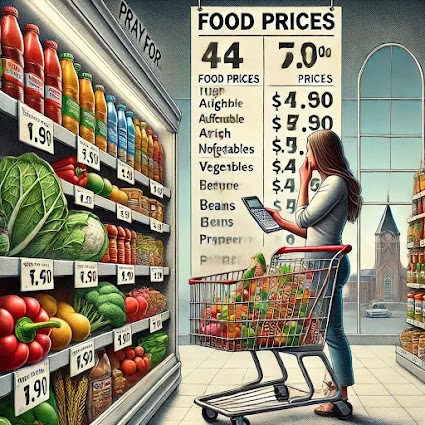How to Eat Healthy on a Budget: Smart Grocery Shopping Tips Amid Food Price Inflation 🛒💰
Why Healthy Eating Is Getting More Expensive, And How to Beat Inflation 📈
Have you noticed that your grocery bill is skyrocketing lately?
You’re not alone. Inflation has driven up the prices of meat, dairy, fresh produce, and even pantry staples. 🍎🥩🥛
But here’s the good news: You don’t have to sacrifice your health just because food prices are rising.
With the right strategies, you can eat nutritious meals without breaking the bank.
Let’s dive into how you can outsmart inflation and keep your diet healthy and affordable! 🚀
Step 1: Prioritize Affordable, Nutrient-Dense Foods 🍎🥜
When grocery prices rise, some foods remain budget-friendly and packed with nutrition.
💡 Best Affordable Healthy Foods:
✅ Oats & Brown Rice – Cheap, fiber-rich, and filling. 🍚
✅ Lentils & Beans – High in protein, iron, and dirt cheap. 🥫
✅ Frozen Vegetables & Fruits – Just as nutritious as fresh but last longer. 🥦🫐
✅ Canned Tuna & Salmon – Affordable protein & omega-3s. 🐟
✅ Eggs – One of the best protein sources for your money. 🥚
✅ Peanut Butter – Packed with protein & healthy fats. 🥜
✅ Greek Yogurt – High in protein, gut-friendly, and budget-friendly. 🥛
🔥 Pro Tip: Buy in bulk! Large bags of rice, beans, and oats cost way less per serving than smaller packages.
Step 2: Cut Costs with Smart Grocery Shopping Hacks 🛒
The way you shop can make or break your budget. Here’s how to shop smarter:
🔹 Make a Shopping List & Stick to It – Impulse buys drain your wallet.
🔹 Compare Unit Prices – Bigger packages often cost less per ounce.
🔹 Use Store Brands – Generic brands can be just as good as name brands.
🔹 Shop at Discount Stores – Aldi, Walmart, and Costco often have lower prices.
🔹 Buy Seasonal Produce – Out-of-season fruits & veggies are overpriced!
🔥 Pro Tip: Download grocery store apps for digital coupons and cashback offers. Those small discounts add up fast! 💸
Step 3: Plan Budget-Friendly Meals & Avoid Waste 🍽️
Planning meals ahead of time saves money and prevents food waste.
💡 Example of a Cheap & Healthy Meal Plan:
🍳 Breakfast: Oatmeal with peanut butter & banana 🍌
🥗 Lunch: Lentil soup with whole-grain bread 🍞
🍛 Dinner: Stir-fried rice with eggs, frozen veggies & soy sauce 🥡
🥑 Snacks: Greek yogurt with honey, almonds, or apples 🍏
🔥 Pro Tip: Make large batches of meals & freeze leftovers. Cooking once and eating multiple times saves time and money!
Step 4: Swap Expensive Ingredients for Cheaper Alternatives 🔄
Some foods are just too expensive right now. Replace them with cheaper options!
❌ Expensive: Fresh Salmon ➡️ ✅ Cheaper Alternative: Canned Tuna
❌ Expensive: Beef ➡️ ✅ Cheaper Alternative: Lentils or Chicken Thighs
❌ Expensive: Almond Milk ➡️ ✅ Cheaper Alternative: Powdered Milk
❌ Expensive: Avocados ➡️ ✅ Cheaper Alternative: Peanut Butter
❌ Expensive: Berries ➡️ ✅ Cheaper Alternative: Frozen Mixed Fruit
🔥 Pro Tip: Don’t be afraid to try plant-based protein sources, they’re way cheaper than meat and just as nutritious! 🌱💪
Step 5: Cook More, Eat Out Less 🍳
Eating at restaurants destroys your budget faster than anything.
📌 Cost Breakdown:
- Homemade Chicken Stir-fry: $3 per serving 🍛
- Takeout Chicken Stir-fry: $12 per serving 🚨
Cooking at home saves you hundreds of dollars per month. Even if you’re busy, simple meals like scrambled eggs, pasta, and stir-fries take less than 15 minutes!
🔥 Pro Tip: Use a slow cooker or instant pot to make meals in bulk with minimal effort.
Step 6: Don’t Fall for Marketing Gimmicks 🚨
Some so-called “healthy” products are overpriced and unnecessary.
🚫 Avoid overpriced items like:
❌ Pre-cut fruits & veggies (cut them yourself & save 💰)
❌ Protein bars (make your own with oats & peanut butter)
❌ Bottled smoothies (blend your own for half the price!)
❌ Organic everything (some organic foods aren’t worth the extra cost)
💡 Pro Tip: Just because something is labeled “healthy” doesn’t mean it’s worth paying double. Stick to whole, unprocessed foods.
Step 7: Grow Your Own Food & Find Local Deals 🌱
If you have a little space, growing your own produce can cut your food bill.
✅ Easiest Foods to Grow at Home:
🥬 Lettuce & Spinach – Grows fast in small spaces.
🍅 Tomatoes – Perfect for container gardening.
🌿 Herbs – Basil, mint, and parsley grow year-round indoors!
🔥 Pro Tip: No garden? Look for local farmers’ market, they often have fresher & cheaper produce than supermarkets!
Step 8: Use Food Assistance Programs If Needed 🏛️
If food prices are severely affecting your ability to eat well, don’t hesitate to use government & community resources.
📌 Food Assistance Options in the U.S.:
✅ SNAP (Food Stamps) – Helps low-income families buy groceries.
✅ WIC Program – Provides food assistance for women, infants & children.
✅ Food Banks & Pantries – Free groceries for those in need.
🔥 Pro Tip: Check local churches, shelters, and non-profits, they often offer free meals or discounted groceries.
Final Thoughts: Beat Inflation & Stay Healthy! 💪
Rising food prices don’t mean you have to sacrifice your health.
With smart shopping, meal planning, and budget-friendly alternatives, you can keep eating nutritious meals without overspending.
📢 What’s your go-to budget-friendly meal?
Drop your tips in the comments! 💬👇
🌟 Key Takeaways:
✅ Food inflation is real, but you can still eat healthy on a budget.
✅ Focus on cheap, nutrient-dense foods like beans, rice & frozen veggies.
✅ Shop smart: Buy in bulk, compare unit prices & use store brands.
✅ Cook more at home & avoid overpriced processed foods.
✅ Use local resources like farmers’ markets & food assistance programs if needed.
#Food #USA #America #HealthyEating #BudgetGroceries #FoodInflation #MealPlanning #SaveMoney #SmartShopping #EatHealthyOnABudget #FrugalLiving 🛒💰🍎



No comments:
Post a Comment